NICE have issued a final appraisal determination (FAD) recommending the use of Inrebic (fedratinib) on the NHS for the treatment of myelofibrosis, a rare blood cancer affecting the bone marrow and disrupting the body’s production of blood cells. Eligible adult patients with primary or secondary myelofibrosis will now be able to access fedratinib on the NHS.
Scott Cooke, general manager at Bristol Mysers Squibb UK & Ireland said: “As the first treatment to be made available for people with myelofibrosis in a number of years, the community has been eagerly awaiting this decision. It is vital that eligible myelofibrosis patients have access to new treatments that can help to minimise the symptoms of the condition, which is why today’s decision is so important to the myelofibrosis community.”
Symptoms for myelofibrosis are often debilitating for those diagnosed, including fatigue, itching, weight loss, night sweats, fever, bone pain, and splenomegaly (enlarged spleen). Median survival of myelofibrosis is around 6 years, though the disease is subcategorised into different risk categories. Prognosis is worse at the higher risk stages of the disease, and approximately 60% of patients are diagnosed in this category. 10-20% of those with myelofibrosis can go on to develop acute myeloid leukemia, an aggressive form of blood cancer, where median survival is a few months.
The drug is recommended within the Cancer Drugs Fund for treating disease-related splenomegaly or symptoms of primary myelofibrosis, post polycythaemia vera myelofibrosis or post essential thrombocythaemia myelofibrosis in adults if they have previously had ruxolitinib.
Claire Harrison, professor of Myeloproliferative Neoplasms and clinical director at Guys and St Thomas’ NHS Foundation Trust, London, commented: “Myelofibrosis is a serious and often debilitating bone marrow disorder, and its associated symptoms can have a severe impact on a patients’ quality of life. Before today, clinicians had very few options to manage this disease in patients who had stopped responding to the current standard of care, and fedratinib will be a much-welcomed new treatment to help manage these patients










